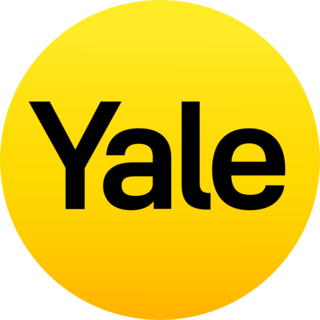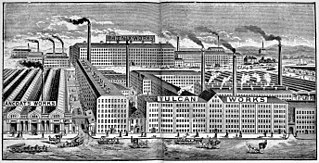Related Research Articles

Locksmithing is the science and art of making and defeating locks. Locksmithing is a traditional trade and in many countries requires completion of an apprenticeship. The level of formal education legally required varies from country to country from none at all, to a simple training certificate awarded by an employer, to a full diploma from an engineering college, in addition to time spent working as an apprentice.

The Leeds and Liverpool Canal is a canal in Northern England, linking the cities of Leeds and Liverpool.

The Manchester Bolton & Bury Canal is a disused canal in Greater Manchester, England, built to link Bolton and Bury with Manchester. The canal, when fully opened, was 15 miles 1 furlong (24 km) long. It was accessed via a junction with the River Irwell in Salford. Seventeen locks were required to climb to the summit as it passed through Pendleton, heading northwest to Prestolee before it split northwest to Bolton and northeast to Bury. Between Bolton and Bury the canal was level and required no locks. Six aqueducts were built to allow the canal to cross the rivers Irwell and Tonge and several minor roads.

The Chesapeake and Ohio Canal, abbreviated as the C&O Canal and occasionally called the Grand Old Ditch, operated from 1831 until 1924 along the Potomac River between Washington, D.C. and Cumberland, Maryland. It replaced the Potomac Canal, which shut down completely in 1828, and could operate during months in which the water level was too low for the former canal. The canal's principal cargo was coal from the Allegheny Mountains.

Linus Yale Jr. was an American businessman, inventor, mechanical engineer, and metalsmith. He was a co-founder with millionaire Henry R. Towne of the Yale Lock Company, which became the premier manufacturer of locks in the United States. He was the country's leading expert on bank locks and its most important maker. By the early 20th century, about three-quarter of all banks in America used his bank locks. He is best remembered for his inventions of locks, especially the cylinder lock, and his basic lock design is still widely distributed today, and constitutes a majority of personal locks and safes.
Waring & Gillow was a noted firm of English furniture manufacturers and antique dealers formed in 1897 by the merger of Gillows of Lancaster and London and Waring of Liverpool.

The Rochdale Canal is in Northern England, between Manchester and Sowerby Bridge, part of the connected system of the canals of Great Britain. Its name refers to the town of Rochdale through which it passes.

Padlocks are portable locks usually with a shackle that may be passed through an opening to prevent use, theft, vandalism or harm.
Ardeshir Burjorji Sorabji Godrej (1868–1936) was an Indian businessman. With his brother Pirojsha Burjorji, he co-founded the Godrej Brothers Company, the precursor of the modern Godrej Group.

Playart was a toy company owned by Hong Kong industrialist Duncan Tong (唐鼎康) that specialized in die-cas toy cars, similar in size and style to Hot Wheels, Matchbox or Tomica. Cars were well done, but were often diecast seconds from other companies like Yatming or Tomica. Cars were made from 1965 to 1983 at the factory in San Po Kong, Kowloon, Hong Kong. Plastic cars and trucks of 1:43, and 1:24 scale were also made, while trains and other theme toys also appeared.
Master Lock is an American company that develops padlocks, combination locks, safes, and related security products. Now a subsidiary of Fortune Brands Innovations, Master Lock Company LLC was formed in 1921 by locksmith-inventor Harry E. Soref and is headquartered in Oak Creek, Wisconsin. In 1970 the company was purchased by American Brands from Soref's heirs. American Brands was later renamed to Fortune Brands, which then split on October 3, 2011, to create the Fortune Brands Home & Security company and the beverages company Beam Inc..
1:18 scale diecast replicas are 1/18th the size of the real vehicle. Most popular in this category are 1:18 scale automobile replicas – usually made out of Zamak zinc diecasting alloy with plastic parts. "1:18 scale" is the colloquial reference to this class of toy or replica.

A wafer tumbler lock is a type of lock that uses a set of flat wafers to prevent the lock from opening unless the correct key is inserted. This type of lock is similar to the pin tumbler lock and works on a similar principle. However, unlike the pin tumbler lock, where each pin consists of two or more pieces, each wafer in the lock is a single piece. The wafer tumbler lock is often incorrectly referred to as a disc tumbler lock, which uses an entirely different mechanism.

The Susquehanna and Tidewater Canal between Wrightsville, Pennsylvania, and Havre de Grace, Maryland, at the head of Chesapeake Bay, provided an interstate shipping alternative to 19th-century arks, rafts, and boats plying the difficult waters of the lower Susquehanna River. Built between 1836 and 1840, it ran 43 miles (69 km) along the west bank of the river and rendered obsolete an older, shorter canal along the east bank. Of its total length, 30 miles (48 km) were in Pennsylvania and 13 miles (21 km) in Maryland. Although rivalry between Philadelphia, Pennsylvania, and Baltimore, Maryland, delayed its construction, the finished canal brought increased shipments of coal and other raw materials to both cities from Pennsylvania's interior. Competition from railroads was a large factor in the canal's decline after 1855. Canal remnants, including a lock keeper's house, have been preserved in Maryland, and locks 12 and 15 have been preserved in Pennsylvania.

Howard & Bullough was a firm of textile machine manufacturers in Accrington, Lancashire. The company was the world's major manufacturer of power looms in the 1860s.

Yale is a lock manufacturer and a subsidiary of Assa Abloy. The company is headquartered in Stockholm, Sweden. Its initial product was the Yale lock, invented by Linus Yale Sr., and it became the foundation of the enterprise founded by Linus Yale Jr. and Henry R. Towne.
Slaymaker Lock Company was a manufacturer of locks founded in 1888, which for a time made steam-powered automobiles. The company invented many unique inexpensive locks and were famous for their warded padlocks.

John Hetherington & Sons was a textile machinery manufacturer from Ancoats, Manchester in England, founded in 1830

Gillows of Lancaster and London, also known as Gillow & Co., was an English furniture making firm based in Lancaster, Lancashire, and in London. It was founded around in Lancaster in about 1730 by Robert Gillow (1704–1772).
References
- ↑ Grace's Guide. "Strebor Diecasting Co". www.gracesguide.co.uk. Grace's Guide.